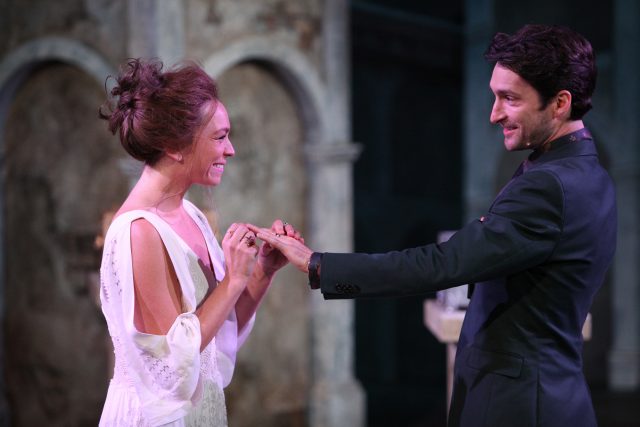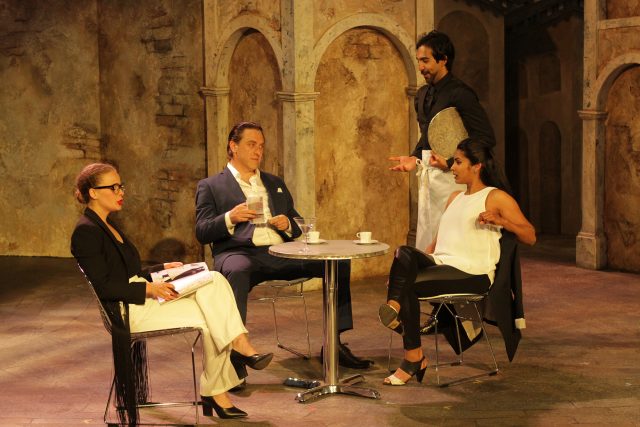The best arts in any form – whether visual, aural, literary or performing – intrigue us because they can be interpreted in several ways and evoke many emotions.
Shakespeare’s The Merchant of Venice is debatably one of the bard’s most controversial because, in a play saturated with prejudices, audience observers cannot help but add their own.
These themes are still relevant over 420 years later, where director Nigel Shawn Williams has time-situated the play into modern Venice. There is a definite bend and focus in his version, which seizes on the latent prejudices, injustices and inequalities within the play and hauls them to the surface.
This is no Shakespearean comedy: it’s snipped and re-arranged into more of a tragedy or rather, in the director’s own words, “a sinister parable.”
In previous renditions of Merchant, the protagonist might be identified as either Portia, the wealthy heiress of Belmont (whose future is trapped by her father’s archaic decree), or Antonio, the merchant whom the play is named after.
In Williams’s version, one is hard pressed to find a flawless hero because all the characters behave badly to one degree or another. Modern Venice is presented as a pretentious hub of wealth and status. Those of a perceived higher class mistreat anyone who is different in race, religion or social standing.
Antonio, played with supremely biting arrogance by Edward Foy, gallantly agrees to guarantee a loan from money-lender Shylock for his spendthrift friend, Bassanio. Charlie Gallant’s Bassanio is a crafty manipulator, dressed in smiles, superficial declarations and chic Italian suits. An unworthy suitor, he needs the money to woo beautiful Portia, whose wealth will relieve him of his money troubles.

[Olivia Hutt, Charlie Gallant]
Olivia Hutt plays the Belmont heiress as an intensely intelligent and headstrong character, frustrated that her fate is controlled by the choice of men, yet she’s a self-proclaimed hypocrite: “I can easier teach twenty what were good to be done, than be one of the twenty to follow mine own teaching.” (I, ii). Once emancipated though, she is intolerant towards illogical male exploits, whether friend or foe.
When Antonio defaults on Bassanio’s loan, Shylock demands his horrible bond in full: a pound of Antonio’s flesh. However, the money-lender receives no more mercy from Portia than I suspect Bassanio would, after he too breaks his bond to her.

[Warren Kimmel, Edward Foy]
Shylock is portrayed with dignity and business-like efficiency by Warren Kimmel. With subtlety, Kimmel allows the veneer to crack, revealing Shylock’s twinges of weakness and vulnerability. Williams’s version of Shylock is neither a clown nor a sympathetic fool. He’s not a miserly, stubborn, uncouth old man who mistreats his servant or his daughter. He is dressed impeccably, like the other Venetians, and by their accounts, just as or wealthier than they are.
At the start of the play, Shylock echoes the same line as Antonio: “In sooth, I know not why I am so sad.” (I, i), but when he falls down in the hurly-burly cityscape, he is spat upon rather than helped. The audience glimpses his anguish in parallel with the Christians’ vulgar ridicule about the elopement of Shylock’s daughter, Jessica.

[Warren Kimmel, Charlie Gallant]
Right from the get-go Williams dials up the emphasis on the indignities suffered by Shylock, making his “Hath not a Jew eyes” speech even more poignant. During the time of Shakespeare’s writing, Jews had been expelled from England so any account of them would have likely included exaggerated stereotypes and mocked eccentricities.
Even the final forced conversion of Shylock to Christianity would have been viewed as a blessing by Elizabethan audiences because his soul could now be “saved.” As cruel artifacts from the Nazi era, contemporary audiences are more sensitive to anti-Semitic prejudices.
Williams reworks the tone of Shakespeare’s language from mockery and banter into revulsion and intolerance, however, his Shylock doesn’t squirm around for legal loopholes like the cunning Christians. He takes his lumps with resignation, proving he is more honest than those who have entrapped him.
Also interesting is Williams’s treatment of the female lead characters. By the end of the play, Jessica, Portia and Nerissa seem to grasp new understanding that their lovers are not entirely devoted and “all that glitters is not gold (II, vii).”
If Bassanio and his merry cackle of hyenas are comfortable bullying outsiders, why would they be any different towards their own women? Portia closes with the last line, “Nothing is good, I see, without respect (V, i).” These are sinister times.
Within this ominous tale, Andrew Cowden’s bumbling Lancelet brings lightness to the dialogue and injects some much needed comedic reprieve.
Marshall McMahen’s unadorned set, which reflects the cutthroat superficiality of the Venetians, is bolstered by Conor Moore’s symbolic video projections of pelf. Adrian Muir tempers his lighting schemes to differentiate the heartless Venice with the bastille at Belmont.

[Luisa Jojic, Nadeem Phillip, Olivia Hutt]
Drew Facey’s costumes exude plenty of upscale swank. Josh Reynolds’s choreographed slow-motion sequences contrast with the scenic fervor to spotlight intimate capsules of character monologues.
Bard’s production of The Merchant of Venice is daring, thought-provoking and high risk. However, strip away the obvious religious tension and this is no more than a cautionary story about extreme bullying and latent prejudices within all of us. Will this retelling change your views?
The Merchant of Venice continues at Bard on the Beach on the Howard Family Stage in the Douglas Campbell Theatre through September 16.
Photos by David Blue.






















